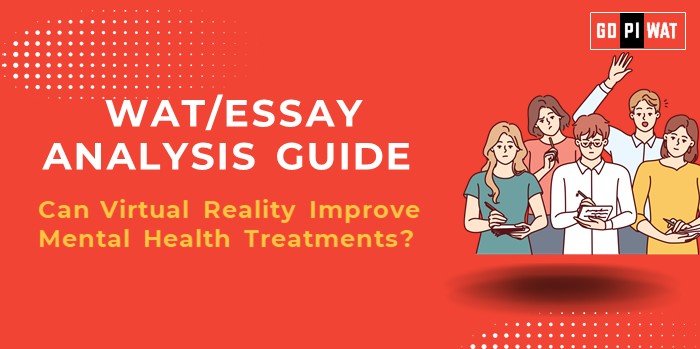📋 WAT/Essay Analysis Guide: Can Virtual Reality Improve Mental Health Treatments?
🌐 Understanding the Topic’s Importance
VR’s role in mental health highlights a fusion of technology and care, offering innovative solutions for pressing societal issues like PTSD, depression, and anxiety.
⏳ Effective Planning and Writing
- Time Allocation:
- 🕐 Planning: 5 minutes
- 📝 Writing: 20 minutes
- 🔍 Review: 5 minutes
- Preparation Tips:
- Research recent data and applications of VR in mental health.
- Identify challenges and propose realistic solutions.
📑 Structuring the Essay
📌 Introduction Templates:
- Contrast Approach: “While mental health issues affect millions globally, VR promises a revolutionary approach, albeit with accessibility challenges.”
- Solution-Based Approach: “VR bridges the gap in traditional therapy by providing immersive and engaging solutions.”
📌 Body Paragraphs:
- Achievements: Use statistics on PTSD and anxiety treatments, highlight successful case studies.
- Challenges: Discuss high costs, limited access, and regulatory gaps.
- Future Outlook: Project the role of AI-VR integration in personalized care.
📌 Conclusion Templates:
- Balanced Perspective: “VR in mental health is transformative but needs scalable and affordable solutions for widespread impact.”
- Global Comparison: “With countries like the USA leading the adoption, global collaboration can ensure equitable access.”
🌟 Recommendations for Sustainable Progress
- Subsidies for VR Hardware: Encourage public funding for affordable equipment.
- Collaborative Frameworks: Develop universal standards for VR therapy.
- Research Investment: Expand evidence-based studies on long-term impacts.
✍️ Sample Short Essays
- Balanced Perspective: “Virtual reality redefines mental health treatments, offering immersive therapies for anxiety and PTSD. While promising, its success depends on overcoming cost and accessibility barriers.”
- Solution-Oriented: “VR therapy democratizes mental health care, combining technology and empathy. Strategic investments in affordability can amplify its reach.”
- Global Comparison: “From the USA to India, VR’s mental health applications showcase transformative potential, yet equitable access remains a shared challenge.”


